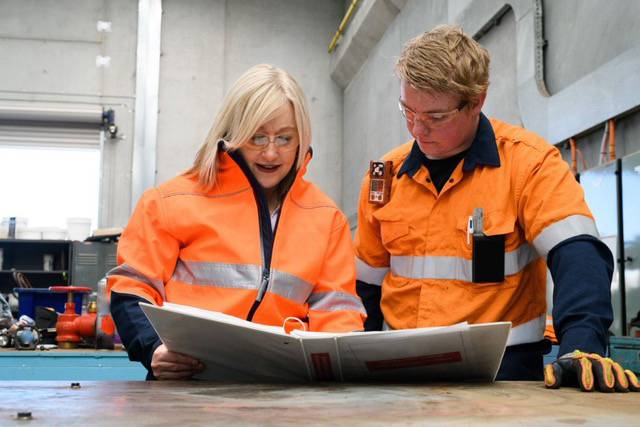Learning pods unite learners and workers with a common purpose.

The manufacturing industry has embraced a learning pod format through apprenticeship programs.
By Nicholas Wyman, CEO IWSI America
Learning pods are proving popular for those in the school sector to keep on track with the curriculum. So, could something similar work in manufacturing and industry?
The answer is yes. Pods are a holistic way of encouraging continuous and lifelong learning. This is what the World Bank says is key to the global knowledge economy. It’s a fundamental 21st-century work skill that will help economies navigate through and beyond the pandemic. And it’s one that can be fostered in-person or online as social-distancing rules dictate.
Embracing learning pods reconfigures workplaces as ‘sites of learning’ or ‘communities of practice’ that unite learners and workers with a common purpose.
Day to day, it could inject a project or inquiry-based to tackle work. It discourages siloes where workers hoard knowledge and engage in a kind of ‘parallel play’ sharing a workplace, not necessarily their knowhow. Workers in learning pods work and learn well together. They do their job and keep amassing knowledge and skills to apply them creatively to familiar and novel situations.
They’re not just collaborating but allowing everyone to embrace learning. A facilitator, such as a team leader or manager, mentors pod members to develop and refine those skills, and will keep staff on track with the driving purpose. Staff need modelling, guiding and training on how to become self-directed lifelong learners. That means structure – organisational protocols and processes – are needed, so staff know what to do and how to do it.
For inspiration to upskill your staff on how to operate in a ‘learning pod’, look to Google’s Genius Hour. There, engineers spend 20% of their workweek on their passion projects, professional development, and approaches to learning that deal with the Forgetting Curve. What’s the point of learning if you don’t retain it or have opportunities to apply that knowledge?
Researcher Linda Orwin describes this scenario as building each person’s capability to become independent and interdependent learners. She calls this approach to learning ‘heutagogy’, as opposed to pedagogy (the practice of teaching children) and andragogy (how to teach adults).
Orwin writes: “Learners use their own and others’ experiences and internal processes such as reflection, environmental scanning, experience, interaction with others and proactive as well as problem-solving behaviours.”
To paraphrase one of our founding fathers, Benjamin Franklin, experience is an expensive teacher. That’s why we need to co-learn in pods. Tesla and Apple do ‘co-learning’ on a global scale, says artificial intelligence researcher Toby Walsh, author of 2062: The world that AI made. “Each night, Tesla cars can download and share the latest improvements in their software. If one Tesla [vehicle] has learnt how to avoid an errant shopping trolley, every other Tesla on the planet quickly knows how to do so, too”.
Don’t think that applies to your business operations? Co-learning is where everyone learns whatever anyone else in a group learns, which boosts the group’s intelligence, Walsh says. It’s happening with language and, increasingly with computer code (think about the clusters of developers working with open source code).
Manufacturing and industry already do a form of learning pod right now. It happens when those businesses take on apprentices or trainees. That’s when you offer both a learning opportunity and real-life work experiences giving apprentices a clear insight into what to expect from their career. And they’re shown around the company, so they know where they fit into the bigger purpose. They’re part of a team – a pod, if you like – and mentored not just on the work, but the work culture, their questions encouraged, so they feel like they belong. If you’re not able to offer apprenticeships or traineeships in the short term, then a mentoring program is a great way to enliven the learning pod concept in your business.
I’ve talked about this on the Thomas Insights podcast, where I encourage industrial businesses to ditch their original vision of what a new employee is. There’s a reason why the U.S. has about seven million vacancies – jobs without people and people without jobs. When recruiting talent, look instead to outside your usual demographic groups. Think of veterans, mature-age people keen to retrain or those who’ve been incarcerated. Every one of them brings rich life experience, knowledge, skills and contacts to your business. These are the kind of people that add diversity to your team. Nurture those in your learning pod(s) to build your talent pipeline and grow staff loyalty and retention. It’s futureproofing you can start right now.
Understandably, manufacturing and industry are in a state of flux now. Eight in 10 U.S. manufacturers said they expect COVID-19 will have a financial impact on their operations, according to the National Association of Manufacturers. And, there could be a fundamental shift as manufacturers switch to different suppliers through the pandemic and don’t switch back when the economy resets as, Tony Uphoff, CEO of Thomas, a leading resource for buyers and sellers, says on the Composites Weekly podcast. Real-time monitoring of supply chains is an emerging technology we’ll see come to the fore, he says.
Manufacturing and industry are facing a shakeup in their external business operations right now. Turbo-boosted digital transformation has begun. It’s time to rethink the structures in which your current and future staff learn to ensure your business can keep up with the pace of change.

Nicholas Wyman
About Nicholas Wyman
Nicholas Wyman is a future work expert, author, speaker and President of the Institute for Workplace Skills and Innovation.
Scott Ellyson, CEO of East West Manufacturing, brings decades of global manufacturing and supply chain leadership to the conversation. In this episode, he shares practical insights on scaling operations, navigating complexity, and building resilient manufacturing networks in an increasingly connected world.